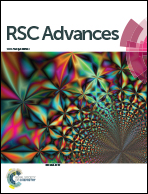Synthesis and characterisation of alkyd resins with glutamic acid-based monomers†
Abstract
Alkyd resins are versatile polymers which have applications in inks and various coatings like decorative paints. They are mainly composed of fatty acids, polyols and aromatic diacids. In this work, glutamic acid as well as N-acylated and N-alkylated derivatives there of were evaluated as bio-based substitutes for these aromatic diacid monomers in the synthesis of alkyd resins. The resins were characterised in terms of structure, molecular weight, viscosity, oxidative thermal stability and colour. N-Palmitoylglutamic acid dimethyl ester can be successfully incorporated when the polycondensation is performed in two steps. In this approach, the bio-based diacid monomer is only supplied in the second step, because the removal of water in the first step is essential to avoid hydrolysis of the monomer amide bond and the subsequent formation of pyroglutamate groups. The molecular weight, viscosity and oxidative thermal stability are lower than for conventional alkyd resins. The mechanism of the discolouration of alkyd resins during polymerisation is mediated by free radical species, which were generated easily in the presence of free amino groups and/or unsaturated fatty acids. Light-coloured resins could be obtained by using saturated fatty acids or radical scavengers during polymerisation.



 Please wait while we load your content...
Please wait while we load your content...